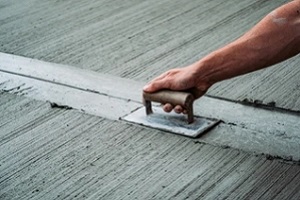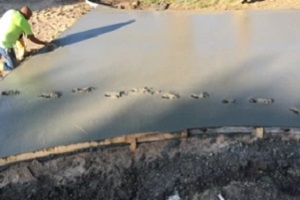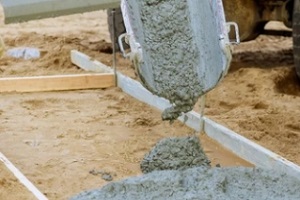 Homeowners are spoiled for choice when it comes to driveway materials, with options ranging from dirt and gravel to asphalt, concrete and pavers. The more affordable options, such as grass and dirt, tend to require more maintenance as they are prone to sinking and require regular mowing, filling and grading.
Homeowners are spoiled for choice when it comes to driveway materials, with options ranging from dirt and gravel to asphalt, concrete and pavers. The more affordable options, such as grass and dirt, tend to require more maintenance as they are prone to sinking and require regular mowing, filling and grading.
Gravel’s potential to shift and vulnerability to weeds and sinking means it needs to be replaced every few years, while the off-gassing and cracking of asphalt does not sit well with many homeowners. Pavers, meanwhile, have great aesthetic appeal and come in a range of textures and colors, but they require yearly maintenance and regular spraying or weeding.
This leaves many homeowners turning to concrete driveways as they provide an appealing mix of convenience and affordability. However, it is important to ensure that a concrete driveway is poured with the right thickness so you can get the most life out of it.
What Determines The Appropriate Thickness Of A Concrete Driveway?
Here is a look at some factors that determine the appropriate thickness of a concrete driveway:
The Base
Concrete is relatively heavy material and needs support to prevent it from breaking or cracking. In concrete driveways, support may come internally through steel reinforcement or externally via proper ground preparation. Compacted soil or a compacted base and subbase of crushed stone are both considered good bases for concrete driveways, but each type of base will influence the driveway’s overall thickness.
The Driveway’s Use
It is important to keep in mind what the concrete driveway will be used for when determining the right thickness. Some driveways may only ever see cars driven or parked on them, while others may need to accommodate dump trucks and heavier equipment.
A 3- to 4-inch-thick pad is sufficient for driveways that will be subjected to the passage of lightweight vehicles. However, heavier vehicles such as RVs, dump trucks and forklifts require thicker slabs. For a standard driveway, there is no need to be concerned about the occasional delivery truck, but many contractors recommend pouring residential concrete driveways at 4 to 6 inches thick on a prepared base for better strength.
Residential Driveway Codes
It is important to check with your local building department to find out about any ordinances or codes governing your driveway’s thickness, approach, width, grade, drainage, location, inspections and other requirements. If you live in an area with a homeowner’s association, you may have additional requirements.
The Type Of Soil Beneath The Driveway
 One big factor that can impact the driveway is the type of soil that sits beneath it. Although concrete can be poured directly onto undisturbed, solid soil, there may be concerns about drainage and elevation. A soil specialist can assess the soil to identify whether it is capable of supporting a driveway and its loads directly or if a base and subbase will be needed.
One big factor that can impact the driveway is the type of soil that sits beneath it. Although concrete can be poured directly onto undisturbed, solid soil, there may be concerns about drainage and elevation. A soil specialist can assess the soil to identify whether it is capable of supporting a driveway and its loads directly or if a base and subbase will be needed.
Some types of soil are not supportive of concrete. For example, topsoil, organic soil and peat need to be removed because they are not good at supporting concrete. More expansive types of soil, such as clay soils and silts, can expand when they are wet and shrink when they dry, which makes them unsuitable as well.
The best soil mixture to support a driveway is a combination of sand, silt and clay, such as loam and other granular soils. Mixed gravel and sand soils tend to drain and compact well and can provide good support. Solid rock like granite and limestone are also suitable.
Keep in mind, however, that removing soil and compacting the ground could cause the slab to sit lower than the landscape surrounding it. If the driveway needs to be elevated, a base of compacted gravel can raise it and improve drainage.
Thicker subbases offer better support for concrete and should be made of larger aggregate gravel than the base itself, which is typically composed of finer material in order to improve grading and compacting.
What Is The Standard Thickness Of A Concrete Driveway?
In most codes governing residential driveways, 4 inches of concrete on a prepared base is the minimum thickness. However, in some areas, using a stronger concrete allows driveways to be poured to just three inches, although this does not have a noticeable impact on cost. Keep in mind that a properly prepared subbase and base will increase the thickness of the driveway by 4 to 8 inches.
Raising the thickness of the concrete from 4 to 5 inches may add as much as 20 percent to the overall cost, but it has the power to increase the driveway’s strength by up to 50 percent. A thicker slab not only supports more weight; it also lasts longer. When a driveway slab is 5 inches or thicker, it needs to be reinforced using rebar.
Driveways that are subjected to frequent use by construction or commercial vehicles are typically 6 inches thick over a prepared base, but they may be even thicker if they need to regularly support heavier loads.
 Many concrete contractors specify 4 inches of concrete on a prepared base of 6 to 8 inches as the minimum that they will install, while the average thickness ranges from 5 to 5 1/2 inches. The overall average thickness of residential driveways including the base is in the range of 10 to 12 1/2 inches. Thicker concrete slabs and bases result in more durable driveways.
Many concrete contractors specify 4 inches of concrete on a prepared base of 6 to 8 inches as the minimum that they will install, while the average thickness ranges from 5 to 5 1/2 inches. The overall average thickness of residential driveways including the base is in the range of 10 to 12 1/2 inches. Thicker concrete slabs and bases result in more durable driveways.
The outer 4 to 8 inches of a concrete driveway’s edge or perimeter should be poured around an inch or two thicker than the middle part to provide additional strength in cases where vehicles drive on or off of it or park close to the edge.
Get In Touch With The Northern Virginia Construction Services Company
We serve Northern Virginia and the surrounding areas with a wide variety of decorative concrete options and can help you build the driveway of your dreams. Reach out to Dirt Connections online or over the phone at 703-828-0866 for all of your driveway and concrete paving needs.
Summary

Dirt Connections was started with one goal in mind: providing quality residential and commercial construction services to clients on time and on budget. Reach out for more information on how we can support your next project.
For your convenience our estimates are free and by appointment. Call 703-940-9949 for a free estimate today!










































